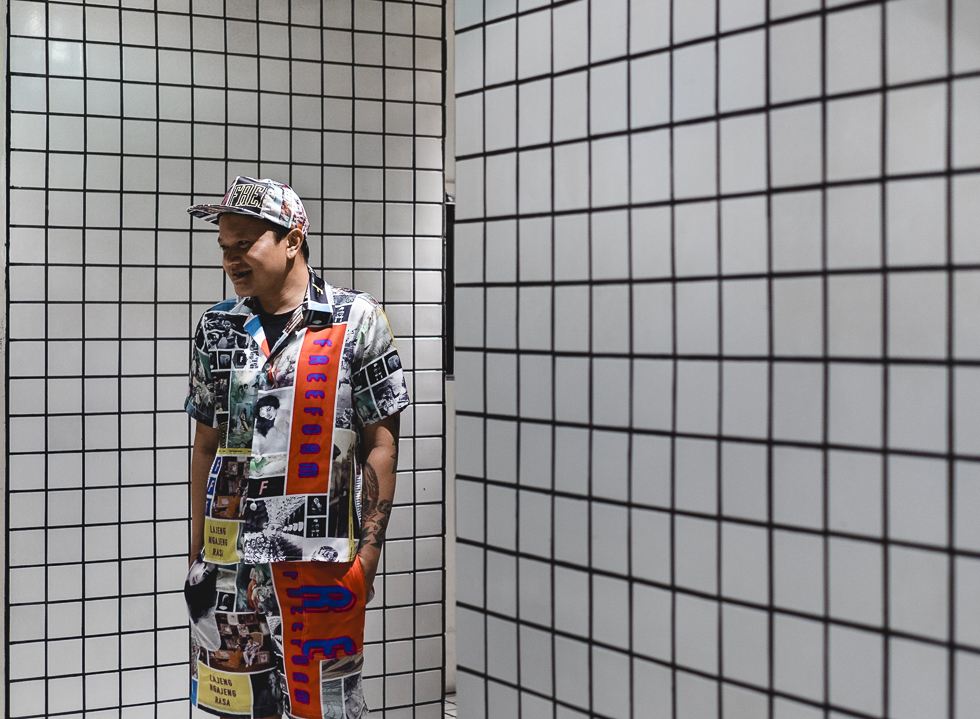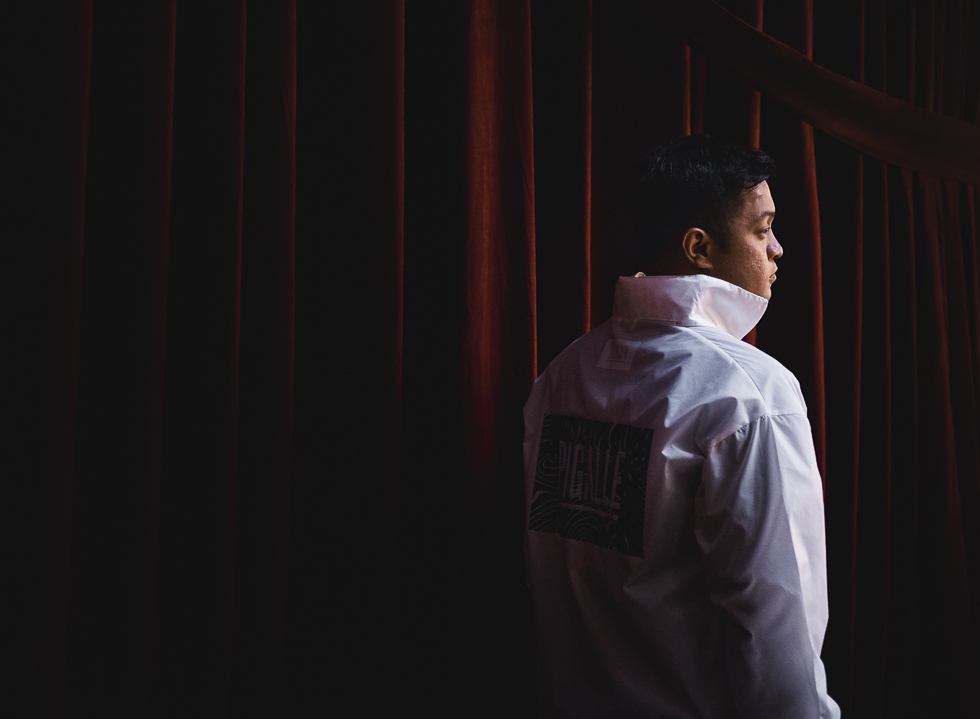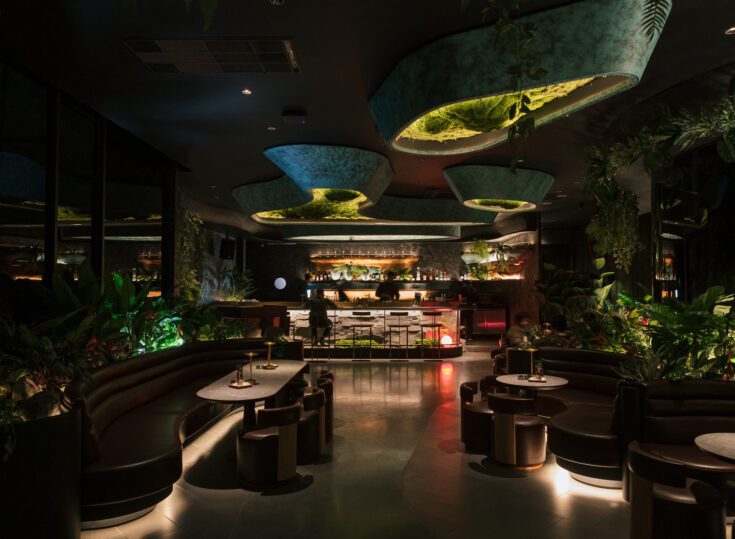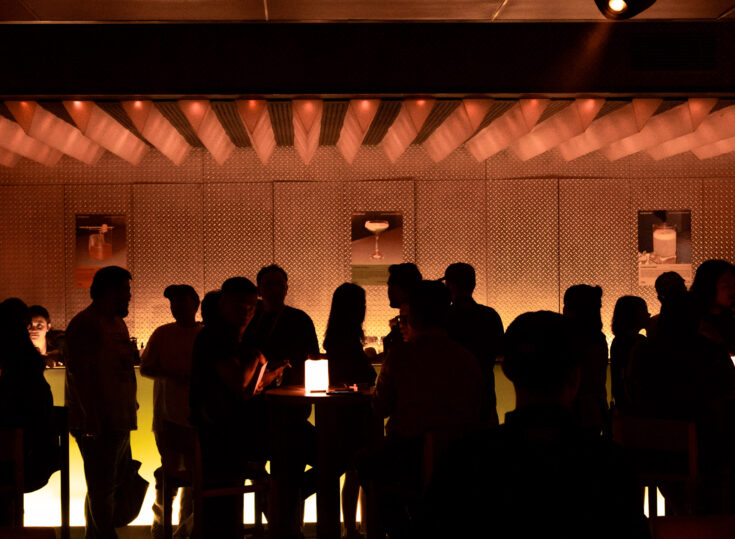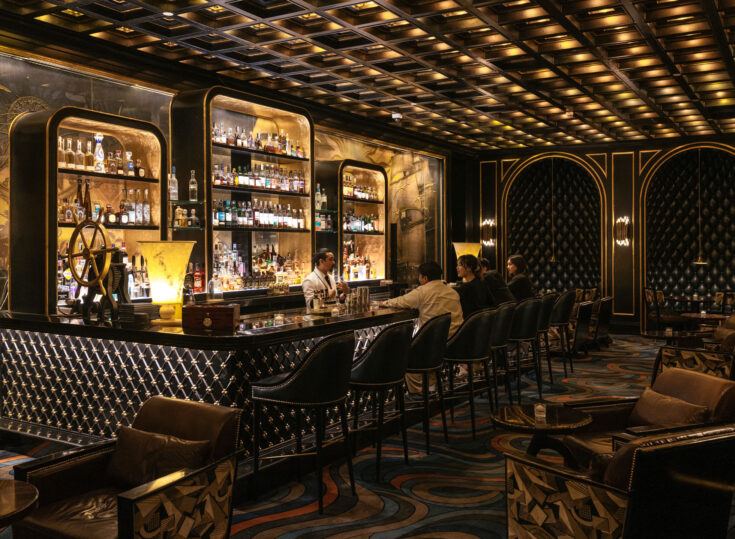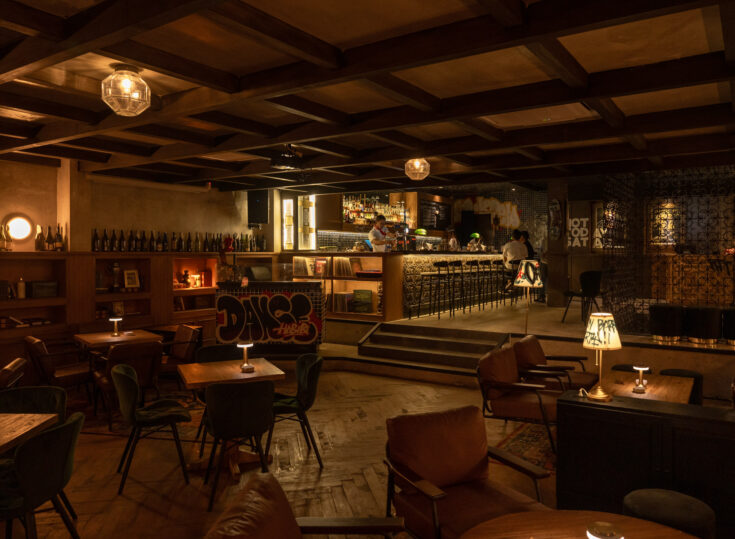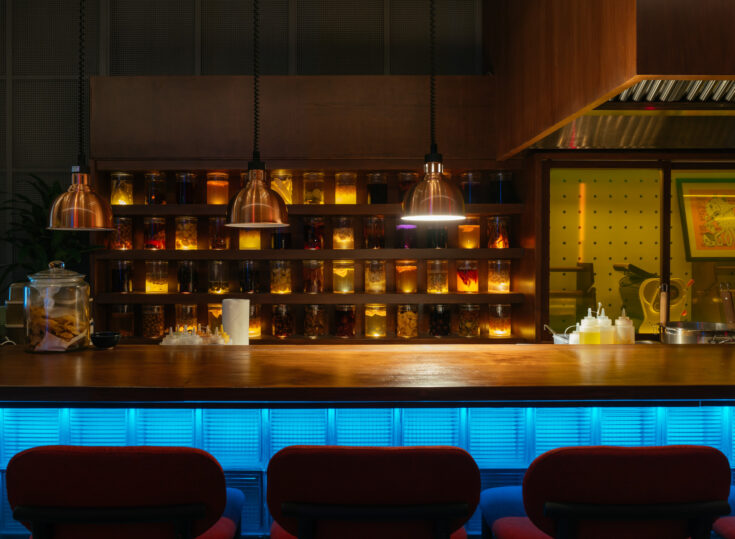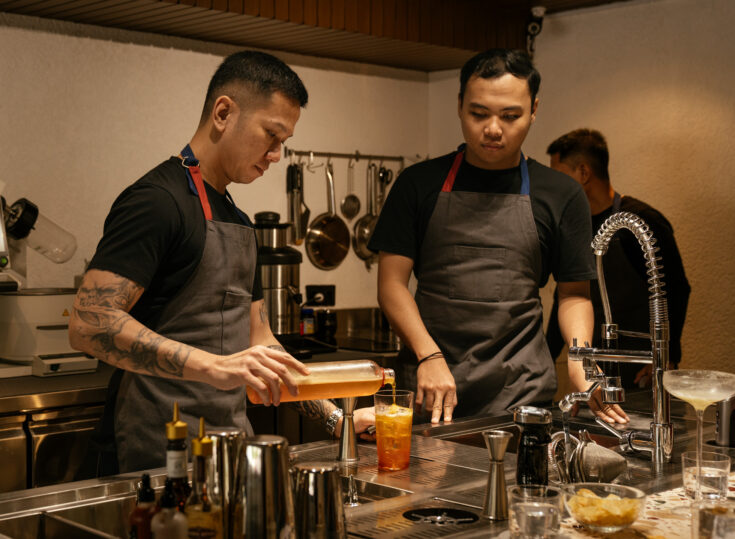Continuing the first article of our two-series interview with six local DJs (in a collaboration with Sindhèn App), we are now moving on to the second part, where we talked with three of the current most noteworthy local DJs, Dipha Barus, Bergas Haryadita and Reza Arnanda (who goes by with the moniker DJ Cream), who have sparked up the city’s nightlife industry.
DIPHA BARUS
Dipha Barus is currently one of the most sought-after DJs. He won the Paranoia Awards (DJ Awards hosted by Hard Rock FM Jakarta) as the Best DJ of the Year for two consecutive years (Best Electro DJ of the Year 2013 and Best DJ of the Year 2014). Aside from his activities as the Music Director and Resident DJ of Potato Head Garage, Dipha is also busy with his regular music event, Pon Your Tone.
Dipha Barus stands out of the crowd in a crew neck sweatshirt by Undercover from Escalier even when flanked by attention-grabbing supermarket aisles.
Manual: What was the nightlife scene like when you first started as a DJ?
Dipha Barus: At that time, Jakarta saw a rise in the underground movement. There were many warehouse and rave parties when I first started. As for me, I started first from the Drum & Bass community.
M: How was it compared to the condition now?
DB: Looking at the current nightlife scene, Jakartans are more accepting towards various genres of music. And that’s mostly because of the Internet that makes everything easier.
M: What are you working on at the moment?
DB: I’m currently working as the Music Director of Potato Head Group, while running Pon Your Tone. Aside from it, I also collaborate with some of my favourite musicians to write songs, as well as DJ-ing in various clubs and parties.
M: Do your friends count on you for music recommendations?
DB: I’m glad I am. My friends also count on me to DJ for their wedding receptions.
M: What is the most common misconception when you tell someone that you’re a DJ?
DB: Most of the times, I prefer to be called as a musician more than a DJ. I think it’s because since I was so young, I’m already familiar with playing multiple instruments.
M: What are you listening to at the moment?
DB: Travis $cott, Action Bronson, Sam Gellaitry, Madlib’s old stuff and Kaseiro.
M: Tell us about the struggle you’ve been through on working as a DJ.
DB: Mainly about balancing my time between DJ-ing and making music.
M: Are there any perks on working as a DJ?
DB: To be surrounded with music is one of the perks. Of course, not forgetting the part where we are able to travel across cities and countries to play music.
To listen to Dipha’s works, head to his SoundCloud profile by clicking here.
BERGAS HARYADITA
One of the seasoned local DJs that bring the Funk, Jazz and Disco sounds to Jakarta’s clubs. Bergas is the founder of Pleasure (a DJ collective, event management that also has its own clothing line) and also one of the Music Editors of Whiteboard Journal, where he curates a selection of songs for the online magazine.
Bergas is decked from head to toe (6 panels cap, bowling shirt and beach shorts) in a chaotic collage print getup from Freeform Fabrication by the stark white tile wall of Potato Head Garage, where he serves as a resident DJ.
Manual: How did you first start your career as a DJ?
Bergas: To tell you the truth, I didn’t want to work as a DJ, and I didn’t plan on becoming to. I liked to collect vinyls back then when I lived in the US. Then a friend came by one day and asked me to DJ in his party. So I did, it was the first time I played. It was in San Fransisco. When I’m back in Jakarta, I was sort of drawn into Future10’s (an event organiser founded by Anton Wirjono) parties. They influence my music to this day, which gravitate towards jazz, hip hop, soul, and 60s and 70s music.
M: What’s your view on Jakarta’s current nightlife scene?
B: It’s thriving! There are so many local DJs whom I think could be compared head-to-head with the international ones. I think people worldwide has been considering Indonesia as one of the significant players in the nightlife scene.
M: What’s trending now in Jakarta’s nightlife scene?
B: I don’t really follow the current trend because there are so many to follow. For instance, in R&B there’s this Trap music trend, there’s also Deep House trend within House music. These things are mainly recycles from the past trend but more polished – just like fashion. When you play these music on the set, people are excited because they’re something they know about. It’s a good thing, because it’s important to know about the past trend. And by featuring those on the past, it’s like paying respect to them.
M: Do your friends count on you for music recommendations?
B: Sometimes! But I can only provide some references because at the end, it is all very subjective. For me, it is better to really look for it by yourself because during the process of finding these songs (that you would potentially like), you’re gonna come across more songs, singers and more varieties to choose from. Don’t like it just because somebody recommends it to you.
M: Working as a DJ must be a lot of fun to you, what are the perks?
B: Free drinks, of course! But mainly I’m glad because what the DJs are doing — what I’m doing — is propagating our music because we’re the ones who shape the public’s music taste. To build a music scene, influence a mass of people and sharing my knowledge on music to them, these are the real perks of working as a DJ.
M: What about the downside to it?
B: Of course, in every job there is at least one, like you always have to work under a “boss”. It’s funny, because most of the times, people have been asking to me, “Who do you work for?” I would say I work for the owner of the clubs I’m playing in and also the crowds. Luckily, I’ve been DJ-ing in underground parties where I can still decide what kind of music sets and genres I’d like to play. But if you’re playing in commercial parties, you have to play according to the crowds’ favourites.
These are the risks of working as a full-time DJ. You gotta follow the crowd and the trend. Therefore, if you don’t want to play as they wish, my suggestion is to see DJ as a hobby instead. Thankfully, I am now a resident DJ for the Potato Head Garage; which I like, because my music taste aligns with them.
To listen to Bergas’ works, head to his music page by clicking here.
REZA ARNANDA (DJ CREAM)
Reza Arnanda, who plays by the name DJ Cream, is the co-founder of Indonesia’s first hip hop party organiser, Soul Menace. He frequently collaborates with Indonesia’s famous musicians, such as Dira Sugandi, Barry Likumahuwa, Andien and RAN.
Reza is standing against the backdrop of Potato Head Garage’s lush curtains under the atmospheric lighting wearing a hoodie by Pigalle from Escalier.
Manual: Tell us about Jakarta’s nightlife scene when you first started your career as a DJ.
Cream: To be honest, when I first started, nightlife in Jakarta was so much more fun, in a sense that people went to clubs to actually enjoy the music, experience the club and hear the DJs play. Nowadays, clubbing is still fun, but with all the technology and social media, when people hear about a party, they’re like “Oh this party is happening, let’s go there to take pictures and post them on the social media!”
The truth is, those social media-oriented people don’t really understand what the essence of the party itself. So back then, when social media wasn’t exist yet, the way people go to clubs was more honest and it is this honesty that makes clubbing so much fun.
M: What else do you think are the differences between then and now?
C: Nightlife in Jakarta is very much different these days if you compare it to the first time I started. Again, with the presence of the Internet and social media, people now are more knowledgeable towards the many genres of music, what’s going on in the other parts of the world, and what can be applied in our country. I’m not talking about the industry’s players, but also the crowd, those who we are playing for.
Yes, we adopt a lot of music culture from overseas, but we somehow adjust it to our culture in Indonesia. And that’s what shapes Indonesia’s identity within the nightlife industry. In a few years, I think this identity will grow even stronger. Jakarta has now become a destination or stopover for a lot of international artists. Djakarta Warehouse Project (DWP), is actually one of the biggest music festivals in the world. As long as the Indonesian music scene keeps evolving, I’m optimistic that we will become one of the prime music centres in the world.
M: Working as a DJ, there must be a lot of misconceptions placed upon you. What are the most common ones you often hear?
C: Stereotypes exist in the nightlife industry. It is always associated with everything negative such as drugs, alcohol, women, sex, et cetera. It doesn’t happen only to the nightlife scene. I mean, if you’re working as a musician, you’ll get associated with these kind of things as well. But what I think is, it can be anyone who is doing these negative acts. I think it’s unfair, because you can find artists in the nightlife field who are true artists. In the end, what really matters is solely depending on your work. People will remember you for your work.
M: What about other struggles on working as a DJ in Indonesia?
C: I had a hard time convincing my family that DJ is the profession I choose. When I started as a DJ, it wasn’t a really promising career choice, especially if you’re looking through parents’ perspectives that are usually conventional.
But then again, I managed to convince everybody about my career and show them that DJ is not a bad choice for my career. At the end of the day, they’ve witnessed that I’m really serious in this profession, and that my job has inspired a lot of people. Compared to how it used to, my family is now more accepting.
M: With the Internet finding music so easy, what do you look for in a song to put into your DJ set?
C: Most importantly, the music needs to be fun and somewhat happy. It also needs to be sexy at the same time. I don’t really know how to define it, but a lot of time I hear people comment, “Oh, your choice of music, there’s a sexiness in it.” So I guess I like songs that have a sexy factor in it.
Because there are so many music in the world I’ve been trying to not putting myself inside a box. I’m trying to open my ears as often as possible and listening to various kinds of music. Only then will my instinct and passion decide which music that I actually like. My advise to people is that to stop putting yourself in one box and listening to only one type of genres. When you DJ passionately and in a fun way, your work will be sincere. And when it’s sincere, your work will reach a lot of people.
M: What are the perks of working as a DJ?
C: Well I must say the free treats. By treats I mean free drinks, free meals, free merchandises, free entries to clubs!
To listen to Reza’s works, head to his SoundCloud profile by clicking here.
This interview has been condensed and edited.

